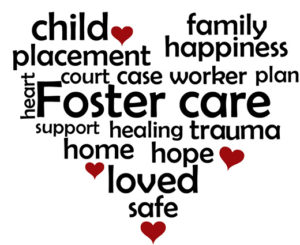 WHAT IS FOSTER CARE?
WHAT IS FOSTER CARE?
Foster Care is a temporary arrangement in which adults provide for the care of a child or children whose birth parent is unable to care for them. It is where children go when their parents cannot, for a variety of reasons, care for them.
Foster care can be informal or arranged through the courts or a social service agency. The goal for a child in the foster care system is usually reunification with the birth family, if possible.
HOW THE FOSTER SYSTEM WORKS IN MARYLAND.
The Maryland Department of Human Services (DHS) is the state agency that oversees the foster care program across the state. Each county and Baltimore City has its own local Department of Social Services (“DSS”). Each county and Baltimore City runs these departments but report to the DHS.
Foster care caseworkers from the county DSS work with families and foster parents (also called “resource parents”) to develop and implement a case plan for children in foster care. A “case plan” is a detailed written description of a child’s needs, the services that will be provided, and the laws that apply.
WHAT DOES A RESOURCE PARENT DO?
Resource parents are responsible for providing children with a safe, nurturing environment.
This includes providing:
- Parental supervision and support;
- Food, shelter, and clothing;
- Health and dental care;
- Opportunities to participate in social, sporting, and cultural events; and
- Emotional support to help the child cope with not being with his/her family.
WHAT ARE THE REQUIREMENTS FOR BECOMING A RESOURCE PARENT?
To be a resource parent, you must be at least 21 years old and apply for “resource home approval” at your local DSS. A resource parent may be single or married.
Here are some of the requirements:
For resource parents:
- Have certain characteristics such as knowledge of, interest in and regard for the principles of good child care;
- Be willing to work well with DSS personnel, such as the child’s caseworker;
- Be mature and create an emotionally stable and supportive climate for the child;
- Help maintain family ties through regular family contact, as required by the child’s case plan;
- Value and respect the child’s racial, ethnic, religious, and cultural heritage;
- Be willing to support and encourage a child’s educational progress, including participating in school conferences and similar activities; and
- Owe no outstanding child support, unless the applicant pays the arrears owed or makes a payment plan with Child Support Enforcement that is acceptable to DSS.
For resource families:
- The resource family must pay for and receive physical examinations for all people living in the home and be re-examined every two years;
- All resource family members 18 years of age and older must pass State and federal criminal background investigations;
- No adult in the resource home may have a felony conviction for child abuse or neglect, spousal abuse, a crime against a child, rape, sexual assault, and human trafficking; and
- No adult in the resource home may have, within 5 years before the date of the application for approval, been convicted of a physical assault, battery or a drug-related offense.
For resource homes:
- Secure certain health and sanitation approvals, including that for lead paint hazards; and
- Meet fire safety, window covering, and general safety requirements.
WILL I BE ABLE TO HAVE VISITS WITH MY CHILDREN IF THEY ARE IN FOSTER CARE?
Yes. Visitation with parents is an important part of the foster parent role, unless the court has determined it is the child’s best interest to have no contact. Remaining in contact with your child or children will be an important part of family reunification. Contact could be letters, calls, conference calls for school conferences, as well as visitation

